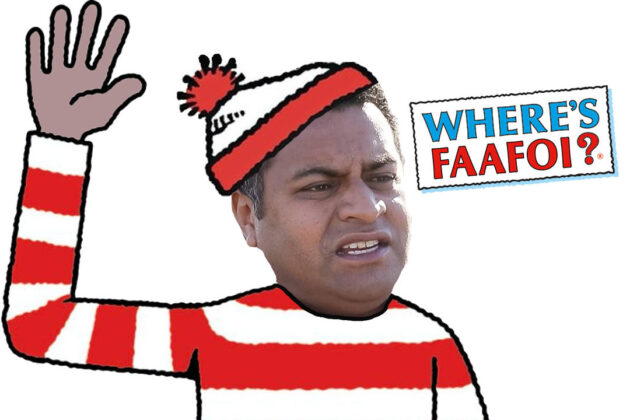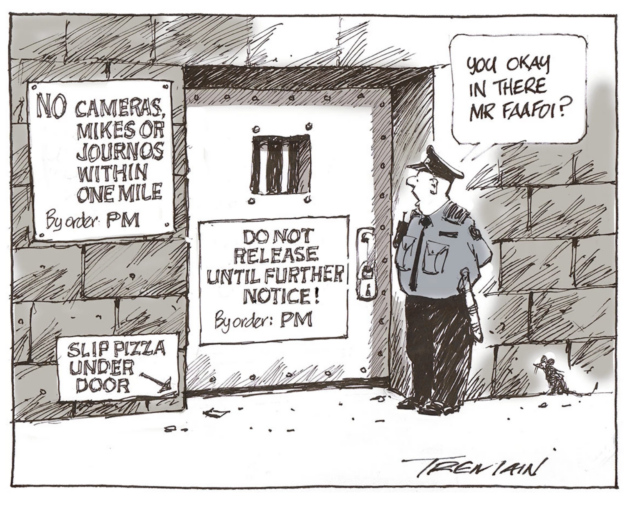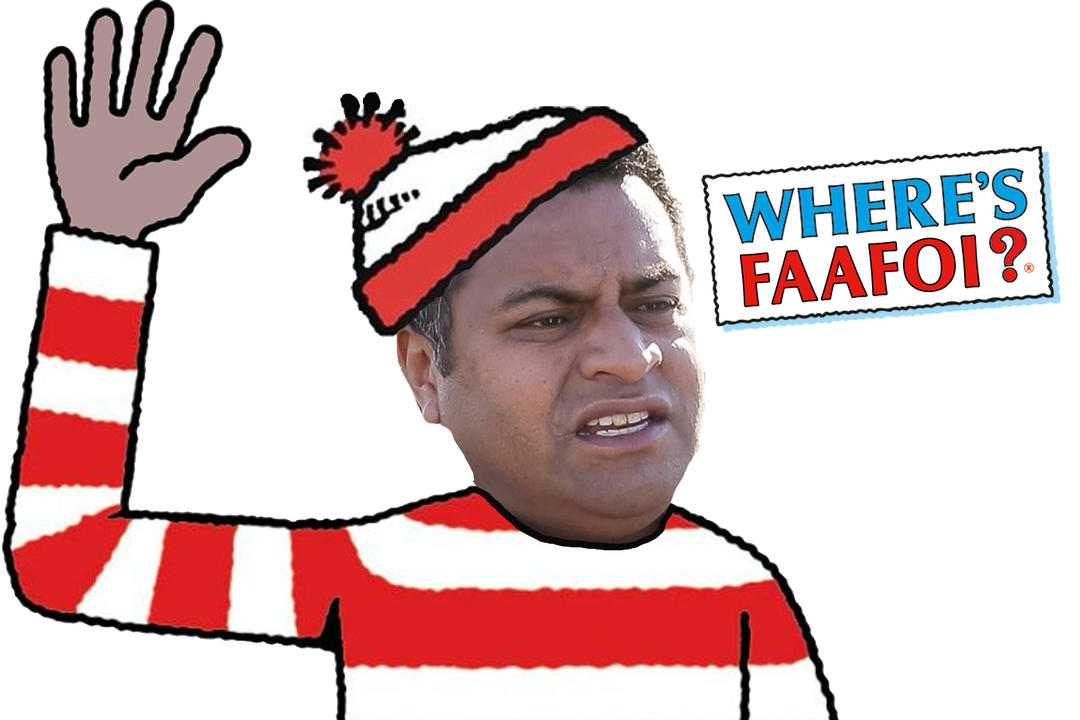Graham Adams
democracyproject.nz
Graham Adams is a journalist, columnist and reviewer who has written for many of the country’s media outlets including Metro, North & South, Noted, The Spinoff and Newsroom
The hate-speech debate is quickly becoming an arena where reputations go to die. Kris Faafoi, the Minister of Justice, learned that dismal lesson the hard way after a train-wreck television interview in late June in which he failed to answer basic questions about exactly what examples of speech might be caught in a proposed law change.
He’s been in hiding ever since. He told RNZ he was too busy to be interviewed even during a three-week parliamentary recess. He has also refused to appear on TVNZ’s current affairs programme Q&A.

Credit: Free Speech Union 
garricktremain.nz
At the beginning of last Sunday’s programme, host Jack Tame prefaced the show by saying that Q&A had asked to interview the Justice Minister about the discussion document put out for consultation to “get a clear sense of what the government actually wants to achieve” but was told that Faafoi “will not be interviewed on the subject at this time”.
As PR consultant Ben Thomas later quipped in a panel discussion, Faafoi appears to be “tied up in a basement somewhere by the Prime Minister’s staff and not allowed to do interviews”.
If Faafoi is permitted to watch television from within his dungeon, he may have briefly found it heartening that guest commentator Steven Price also struggled to give definitive answers to some of the questions that had foxed him.
Jack Tame asked the media law expert whether Israel Folau’s comments about “the rainbow community and homosexual people” going to hell if they didn’t repent would qualify as hate speech?
Steven Price’s close analysis ranged through “probably not”, “arguable”, “a tough sell” and “extremely unlikely”.
Tame: What about a tweet saying “transwomen are not women”?
Price: “Trans is one of the hard areas!… Is it threatening, abusive or insulting? It could well be… It’s hard to tell in that context what discussion you’re playing into.”
Any pleasure Faafoi might have felt at hearing Price’s less-than-definitive answers would, of course, have been very short-lived given the clear conclusion he ultimately reached. When Tame asked: “So is there any way of having a clear and distinct threshold short of incitement to violence so that people can know for sure what constitutes a crime and what doesn’t?” Price replied, “I don’t think so! I haven’t been able to think of one.”
Unfortunately, the Justice Minister knows he is going to have to emerge from his basement at some point and do his best to explain exactly at what point speech becomes a crime scene — even though a highly articulate and learned media lawyer like Steven Price can’t point to the existence of any firm threshold.
However, Faafoi could always adopt Sue Moroney‘s disarmingly straightforward approach to how the ordinary person can ensure they stay out of trouble. During the panel discussion following the interview, the former Labour MP offered what she saw as an easy and practical solution.
Her fellow panelist Ben Thomas had just summed up the problem:
“What people hear from the government’s silence is: ‘We’re going to make some things that you say illegal but we’re not going to tell you which ones.’ And that’s the kind of uncertainty … that makes a lot of middle New Zealanders feel a little uncomfortable.”
Moroney had no time for those citizens who expect some certainty from their nation’s laws:
“Well here’s a tip for middle New Zealand. If you think that what you’re about to do or say or tweet might actually be hate speech or might be captured by the law, don’t do it… and we’ll all be better off.
“If you’re making that judgement — ‘Could this be illegal?’ — don’t do it!”
Certain she had cracked the problem that had defeated the Minister of Justice and possibly Steven Price as well, she triumphantly delivered a verdict on her own wisdom: “Common sense!”
Moroney’s recommendation for widespread self-censorship — which was roundly mocked on social media — might be best summed up as a Kafkaesque variation on an old adage: “The innocent have nothing to fear from the law… even if they have no idea when they are breaking it!”
Moroney also made a connection between defamation laws and hate-speech laws.
“We don’t have any problem with defamation laws that are normally around the reputations of pretty wealthy people… but when it comes to protecting minorities and some of the most vulnerable in our society through this type of law, suddenly people find it too hard…”
It seems Moroney hadn’t listened very closely to the interview with Steven Price. He had just outlined how hard it is to design a law to protect minorities that doesn’t turn into a double-edged sword.
He pointed out that it is often minorities themselves who end up being the targets of hate-speech prosecutions:
“Hate-speech laws are often used to prosecute the very minorities that they are designed to protect” — such as “gay people who are attacking religions who are attacking them”.
This point seemed to have escaped Moroney’s attention — although to be fair it seems to be dawning only slowly on some minorities themselves.
As RNZ reported in late July:
“Gender Minorities Aotearoa’s national coordinator Ahi Wi-Hongi said the reforms also needed to be clarified so they couldn’t be used against the minority communities they are supposed to protect.
“I think it’s really important the legislation is really specific about who and what types of speech will be covered by the legislation. We want to make sure that whatever is in these laws will protect trans people and not be used against trans people who are standing up to bullying and harassment.”
This is the impeccably self-serving position otherwise known as “Hate speech for thee but not for me.”
Moroney’s comparison between the proposed hate-speech laws and existing defamation laws, although intuitively appealing, also overlooks fundamental differences.
As most capable editors, subeditors and journalists know, the laws around defamation provide a pretty good idea of what they need to do to keep themselves out of trouble.
Unlike the proposals for a hate-speech law change, truth is a complete defence to a defamation claim. Honest opinion also provides a robust defence. Consequently, those in the media can decide what risks they are willing to take.
As it happens, the dangers of introducing an ill-defined law were illustrated by a video on the social media site TikTok of a police officer talking to a group of street preachers on Auckland’s Karangahape Rd just after midnight recently. A preacher on screen claims his group was threatened by others despite the fact they were only professing Jesus’s love.
The officer tells them:
“There is a difference between preaching and hate speech and you are very close to crossing the line.”
The preacher:
“The [hate-speech] law hasn’t come in. And we’re not actually preaching hate.”
The officer:
“What you guys are saying is very subjective and saying it to people up here [on K’ Rd] could be taken as disorderly behaviour likely to incite violence, okay?”
What? Inciting violence against themselves? It would certainly be a novel interpretation of “inciting violence” when members of the preacher’s group had said it was other people who had threatened and assaulted them.
With the caveat that viewers can’t tell from the short clip exactly what led to the encounter with the police, the Free Speech Union found the episode a “startling omen of things to come”.
“New hate speech laws haven’t even been written yet but police are already out on our streets determining what hate speech is, claiming the street preachers are apparently ‘very close to the line’.
“While we can’t be sure what transpired before the video, ultimately it will be the police who are charged with enforcing these proposals. While the ambit for successful prosecution may be high, overseas experience has shown law enforcement to consistently overstep the mark and has created a structure allowing for legal harassment of the state against citizens, even if they are ultimately found not guilty.”
It appears that the standoff with the preachers was sparked by the noise of their amplifiers late at night as they spread the message of God’s love.
A police statement issued after the incident said:
”The group were spoken to by police about their conduct. They moved on after being spoken to.
“People were advised to contact Auckland Council in the first instance for any noise complaints.”
Noisy preachers late at night can undoubtedly be very annoying and no doubt deserve to be moved on for their sins if they are causing a breach of the peace — but certainly not on the pretext of their having broken a yet-to-be-passed hate-speech law.
As barrister and legal commentator Graeme Edgeler said on Twitter:
“The police officer is recorded saying there’s a fine line between preaching and hate speech. He then explicitly acknowledges they had not crossed that line, and still thinks he has a role in policing what they are saying. That is concerning.”
This article can be republished under a Creative Commons CC BY-ND 4.0 license. Attributions should include a link to the Democracy Project.
Please share so others can discover The BFD.

